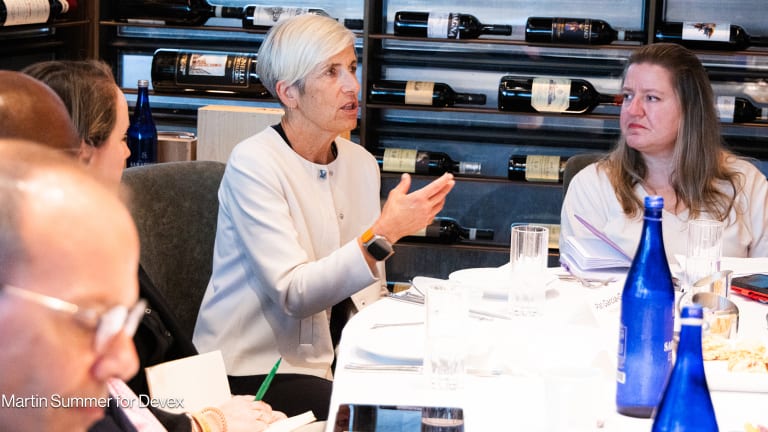
Psoriasis, which affects more than 60 million people globally, is too often misunderstood or seen just as some kind of skin issue. It is, in fact, a systemic, lifelong inflammatory condition which currently has no cure. Its effects go beyond the skin, causing a cascade of other illnesses and preventable suffering, not only for a person living with the disease, but also for their families and people around them. In addition, knowledge about the disease among health professionals is often limited, leading to risks of wrong diagnosis and lack of proper treatment.
“Psoriatic disease is an NCD [noncommunicable disease], and many people mistake it as being something only visible on the skin and only cosmetic,” said Frida Dunger, executive director of the International Federation of Psoriasis Associations, or IFPA, during an event hosted in partnership with Devex on the sidelines of the 80th United Nations General Assembly. “It is a very complex disease, associated with other NCDs, for example mental health, diabetes, cardiovascular disease.”
Kate Reynolds, an IFPA ambassador living with generalized pustular psoriasis, or GPP, a rare and potentially life-threatening variant of psoriasis, shared her memories of the first outbreak, which was both a traumatic and life-changing experience. “When this first happened, folks said: ‘Didn’t you have a rash?’”
In reality, the outbreak resulted in a three-day hospital stay, with Kate losing 70% of her skin and missing a month of work. The side effects of the medication, she explained, led to additional health complications.
Speaking about how it affected her mental health, Kate noted: “There’s the anxiety from the inflammation and the anxiety from not knowing when another outbreak will come. You can’t work … So there’s the loss in so many ways.”
Psoriasis is one of many NCDs where significant care gaps exist globally, and most attempted solutions to address this issue rarely include the perspective of those living with the condition itself.
In 2014, the World Health Organization adopted its first and, until today, the only resolution on psoriasis, recognizing it as a major global health challenge. This has been seen as a significant breakthrough by the psoriatic community. Unfortunately, the progress since then has been poor or inconsistent across the globe.
As world leaders prepare to adopt a new political declaration on NCDs, Reynolds and Dunger discussed the importance of treating people with lived experience not as passive beneficiaries, but as co-creators of more sustainable and equitable solutions.
Inclusive policymaking strengthens NCD responses
Excluding patient voices from decision-making leads to fragmented systems and policies that fail to meet the real-world needs of patients. Reynolds shared how her own experience helped highlight the gap between survival and quality of life. “[Survival] is a great outcome for what was happening to me, but there’s a world of difference between ‘not dead’ and ‘thriving,’” she said.
Reynolds also spoke of how policies directly influenced her treatment by doctors, including which medications she received depending on insurance coverage. “In Canada, most of our medications are only covered through private insurance, and they want to cover the cheapest option. I’ve been told that I’ve been treated with a hammer, but I could have a scalpel. In the years since my outbreaks, I’m healing from having been treated with such high-dose steroids for so long.”
Dunger concurred that listening to lived experience is essential to guiding policymaking that puts patients first. Referring to Reynolds’ experience, she said, “What if we changed that and instead gave the treatment that gave the best impact from the beginning?”
Psoriatic disease as a lens for integration
Psoriatic disease is much more than a niche condition; it offers a window into broader NCD system gaps, as the discussion highlighted. It often coexists with other chronic illnesses and has a significant impact on mental health.
Over 80% of people with psoriatic disease experience stigma and discrimination, with nearly half reporting anxiety and a quarter diagnosed with depression, according to Dunger.
Reynolds emphasized the importance of holistic approaches to treatment that consider all these factors. “A lot of times, I feel like we’re treated like a series of illnesses … You can’t just treat one part of a person; you have to treat the whole person.”
Integrating psoriatic disease into universal health coverage frameworks and primary care could help shift systems toward patient-centered models that serve a wider NCD community.
Mobilizing allies and coalitions
Dunger and Reynolds also spoke of how turning principles into practice requires mobilizing diverse allies — from ministers to grassroots advocates.
IFPA is pushing to move “No decision without us” from rhetoric to reality through campaigns such as “Stop the domino effect,” launched as a part of World Psoriasis Day, observed on Oct. 29. As Dunger explained, “Treating psoriasis early and with treatment that actually works from the beginning can help stop other comorbidities from developing.”
Reynolds added that inequities in diagnosis and care must also be addressed: “I wonder sometimes, how many people are missed because they don’t even know what treatment they need, let alone being able to access it.”
By centering lived experience in policymaking, coalitions such as IFPA are helping shift the global NCD agenda toward more inclusive, resilient, and equitable health systems.
Watch the full Psoriatic disease and NCD: Putting lived experience at the heart of policy panel session here.








